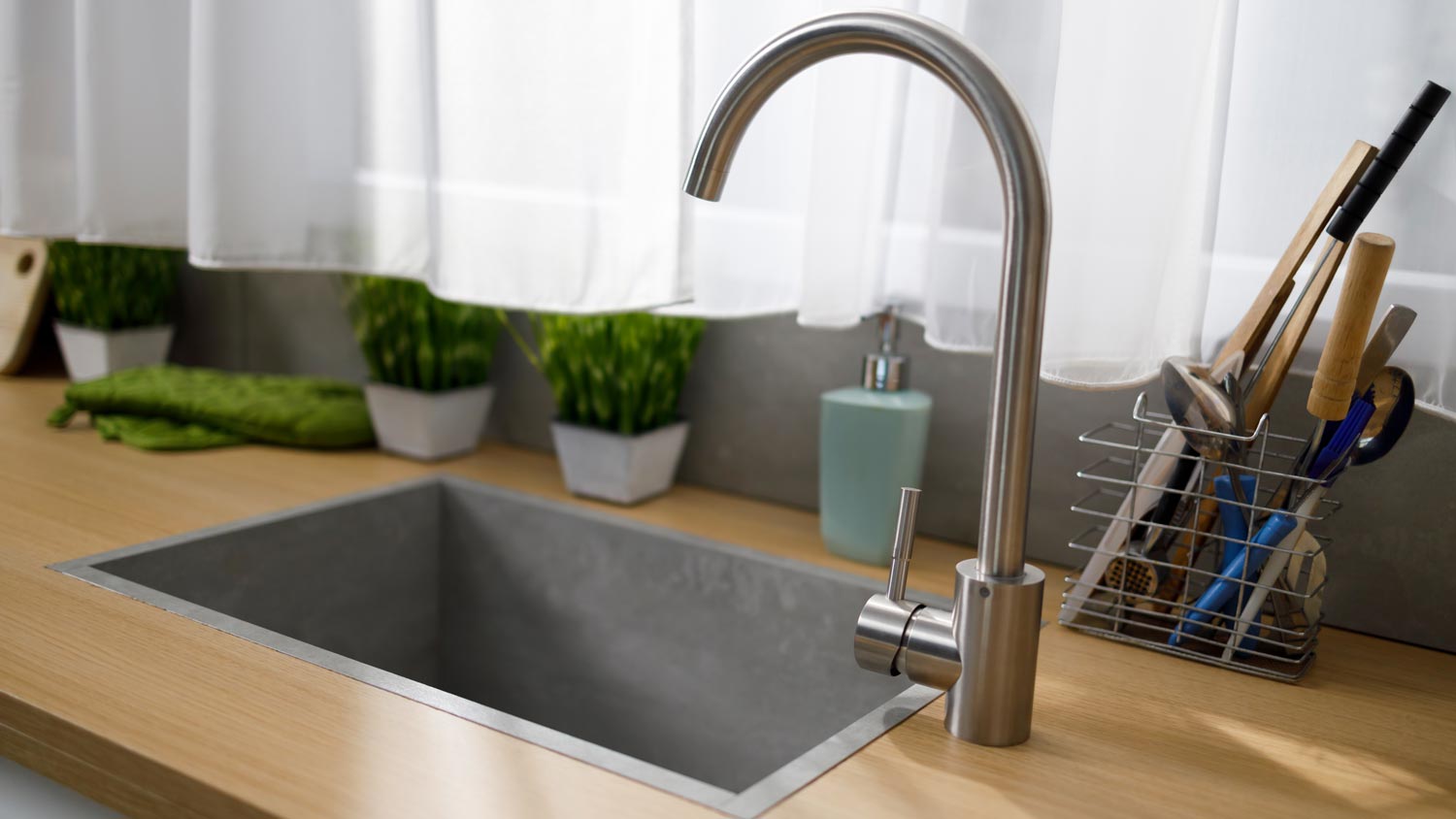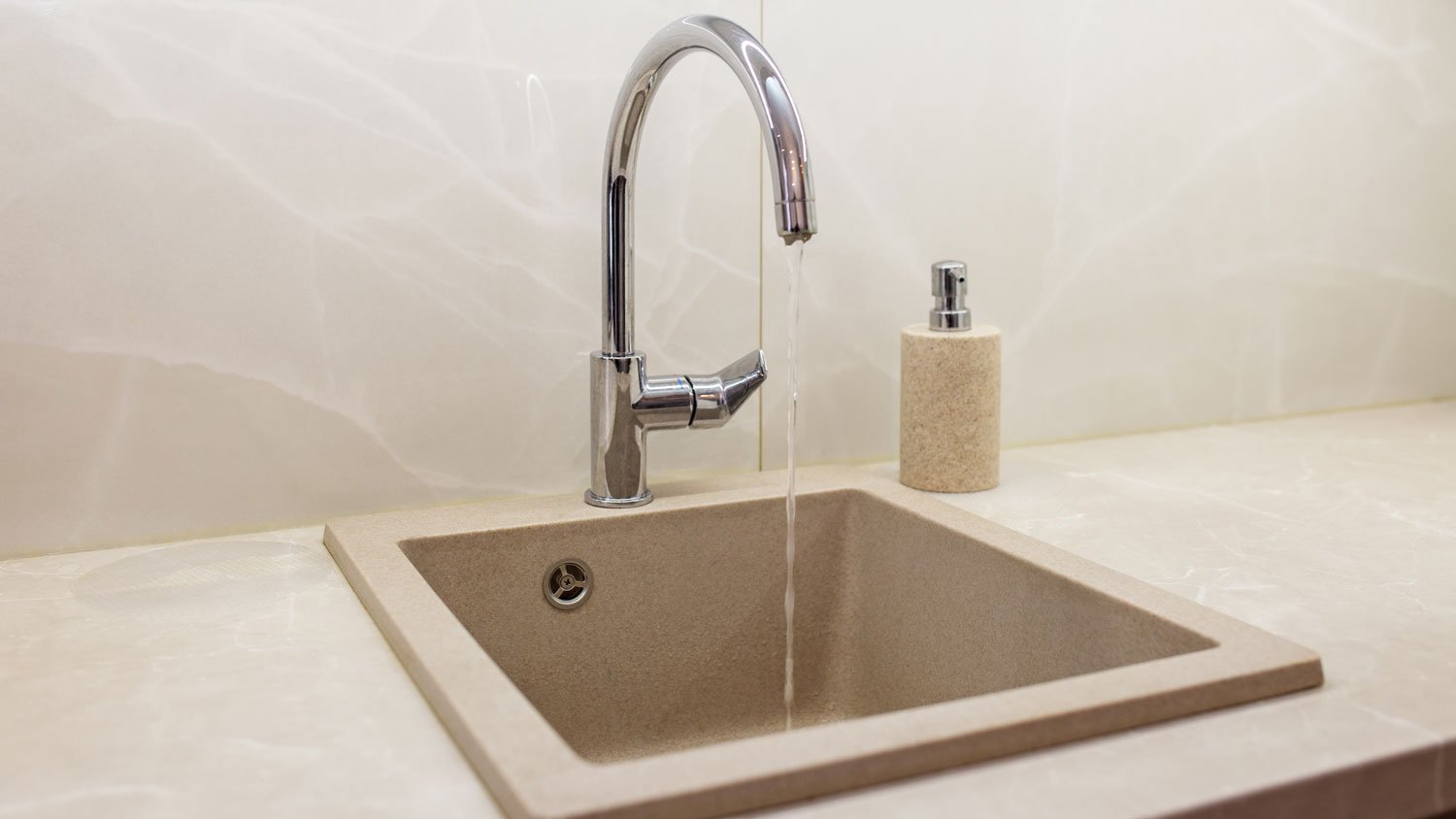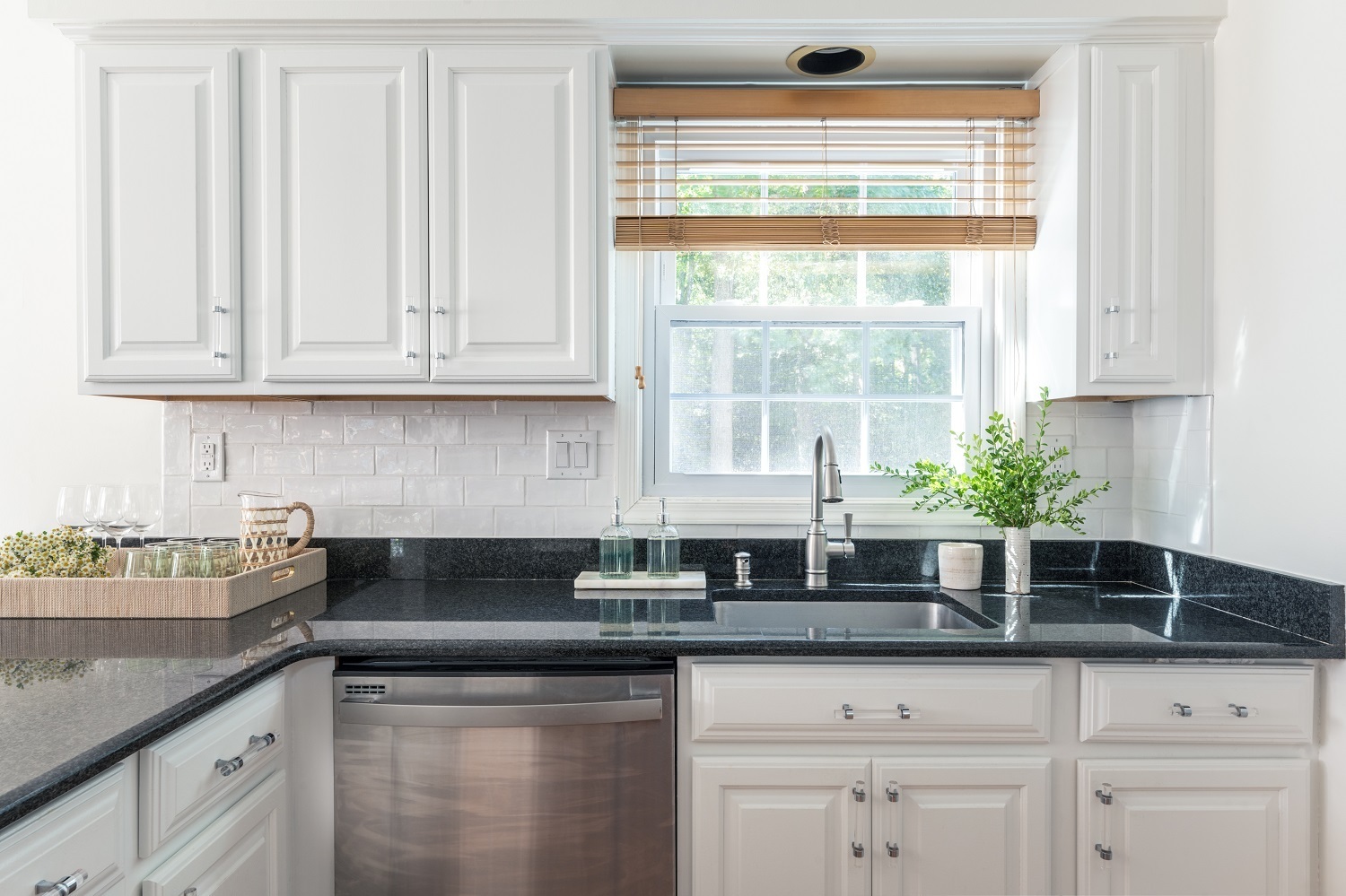Quartz Sinks Pros and Cons: Here’s What to Know
Love your sink—quartz and all


Quartz sinks are made of natural stone and resin composites.
They cost a fraction of the price of traditional stone.
Quartz sinks are nonporous, making them mold and odor-resistant.
Composite quartz is durable but unforgiving for dropped dishes and glassware.
From kitchen sink sizes to types of kitchen sinks and their unique materials, there are many decisions regarding where you'll wash your hands and dishes daily. While a quartz kitchen sink may be intriguing, this material can be quirky. Consider all quartz sink pros and cons before you decide if this type of sink is a good fit for your kitchen.
What Are Quartz Sinks?

Unlike most stone kitchen sink materials, quartz is an engineered stone. Quartz sinks (countertops) are often 80% to 90% ground quartz and 10% to 20% resin, pigments, or other compounds.
Because they’re engineered stone, quartz sinks are non-porous, making them easier to maintain than traditional stone sinks. That benefit, along with several others, has contributed to the material's popularity in kitchens and bathrooms. However, some drawbacks include the heavy weight of quartz sinks and their tendency to break dishes.
| Pros | Cons |
|---|---|
| Durable and nonporous | Synthetic |
| Quiet | More breakage |
| Many color options | Wear and tear |
| Affordable | Heavy |
| Many sizes | Cracks |
Pros of Quartz Sinks

Quartz sinks can be affordable, durable, and fairly easy to maintain. It can be a great choice for a design-minded homeowner who wants a premium look but is on a tighter budget.
Durability
Because it’s a composite stone, quartz is very durable. It’s resistant to scratches and dings you might encounter with other stone sinks. Similarly, its durability means it can withstand high levels of heat.
Quiet
Quartz sinks aren’t technically soundproof but quieter than their stainless steel counterparts. The hard, durable engineered stone creates a much more serene dishwashing experience.
Color Options
Thanks to the 10% to 20% mix of resin and pigments in composite quartz, you have much more control over the sink's color and look than with other traditional stones.
Affordable
Composite quartz sinks are relatively affordable compared to traditional stone sinks. For a stone sink, you’ll pay upward of $1,000, compared to $300 to $600 for a composite quartz sink. Even a traditional stainless steel sink is pricier, with higher-end models costing up to $1,500.
Additionally, porcelain or granite can be more challenging, increasing the sink installation cost. Quartz sinks also don’t require sealing like traditional stone sinks.
Nonporous
Thanks to its engineered material, quartz sinks are nonporous. These sinks stand up to food, drink, and moisture without staining. Similarly, their surface makes them resistant to mold and bacteria, keeping your sink fresh and odor-free.
Size
Because quartz is an engineered material, it’s much easier to produce a variety of sizes and styles than traditional stone. A quartz sink could be the right fit if you have a specific dimension in mind but want a natural stone look.
Cons of Quartz Sinks
The engineered quality of quartz sinks makes them ideal for many households. But, if you’re on a budget, living with kids, or accident-prone, you might be better off with an alternative material.
Synthetic
Quartz might not be the right fit if you're a materials purist. Since it's engineered, it's technically synthetic. If you're looking for the quartz finish in a solid stone, consider quartzite, which is pricer but 100% natural.
More Breakage
A quartz sink won't be a good fit if you're prone to dropping dishes and glasses. Its durable and hard surface means it'll last long, but any dishware you drop in the sink won't. Plates, cups, and bowls will be more prone to chipping and cracking in this tough-as-nails sink.
Wear and Tear
While quartz sinks come in various colors, the darker variations tend to show more scrapes and scuffs over time. Even a lighter quartz sink can show staining over time if you use certain chemicals to clean it.
Heavy
Depending on the size and type, quartz sinks can be very heavy, requiring multiple people to install them. They must also be properly braced and installed to ensure they don’t go anywhere.
Cracks
Even scratch-resistant quartz won’t withstand being dropped or repeatedly hit with a heavy object. Similarly, if a quartz sink is exposed to high heat over a long period, it may shift and crack.
Even though quartz is a durable material, it’s not indestructible.
Alternatives to Quartz Sinks
Quartz isn’t the only sink material available. Depending on your needs or budget, one of these alternative sink materials might be a better fit.
Stainless steel is far and away the most popular sink material. It’s easy to clean and comes in a variety of sizes, including single and double sinks. However, it tends to be noisy and shows scratches more easily.
Cast iron is heavy, durable, and comes in various colors. But these sinks are super heavy and require more upkeep to prevent rusting.
Copper lends a traditional feel to a home and is one of the most bacterial-resistant sink materials. On the other hand, copper is very expensive, dents easily, and requires specific maintenance to avoid scratches.
Fireclay looks like an enamel sink, but it is more resistant to scratches and dents. However, it is harder to find, expensive, and challenging to install.
Solid surface sinks are some of the most affordable and come in many variations. But, some can be poorly made, translating to scratches and stains.
Is a Quartz Sink Right For You?
If you or your kids tend to drop dishes in the sink or are sticking to a tighter budget, quartz sinks are probably not the right choice. Consider an acrylic or stainless steel sink instead.
But, If you like the look of natural stone but want something with lower maintenance and a smaller price tag, a quartz sink could be the perfect fit. Just keep in mind that these sinks are heavy. To avoid damaging them during installation, look for a professional sink installer near you to assist with the process.
Frequently Asked Questions
Because it’s an engineered stone, quartz composite is much denser than other natural stone alternatives. For instance, if you drop a heavy object in a natural stone sink, there’s a chance the sink could crack, chip, or dent. Quartz’s density means quartz sinks are more resistant to scratches or staining. However, darker quartz sinks are more likely to show scratches or scuffs, and quartz sinks can stain over time.
Quartz sinks are incredibly durable, making them resistant to cracks and chips. They’re a high-density engineered stone, so they’re less likely to crack when exposed to daily impact. But because quartz sinks are so dense, they are very heavy, making installation a challenge. If you’re a novice, there’s a chance dropping one during installation could crack or break the sink. Additionally, repeatedly dropping heavy objects into them could create a crack.
Natural stone stinks require sealing before installation because they have a porous surface susceptible to staining and damage. Quartz is much denser than natural stone, making it non-porous and resistant to stains or absorption. Because quartz is a composite material, it doesn’t need to be sealed before daily use.





- Bathroom Remodeling
- Kitchen Remodeling
- Shower Installation
- Stair Installers
- Bathtub Installation
- Shower Door Installers
- Kitchen Design
- Bathroom Design Companies
- Storm Shelter Builders
- Pre-Made Cabinets
- Kitchen Refacing
- Bathtub Replacement
- Ceiling Tile Installation
- Suspended Ceiling Companies
- Residential Designers
- Stair Builders
- Remodel Designers
- Shower Enclosures
- Home Renovations
- Kitchen Renovations
- Garage Remodeling
- Grab Bar Installation
- Walk-In Tub Installers
- Tub to Shower Conversion
- Balcony Contractors
- Pros and Cons of White Quartz Countertops: Are They Right for You?
- How Long Do Quartz Countertops Last?
- Do Quartz Countertops Need to Be Sealed? Find Out the Answer
- Are Quartz Countertops Heat Resistant?
- Laminate vs. Quartz Countertops: Which Is Better for Your Home?
- Quartz vs. Marble Countertops: Which Is Best for You?
- Quartz vs. Tile Backsplash: Which One Is Better? Costs and More
- 10 Best Kitchen Sink Materials and Pros and Cons of Each
- How to Clean Any Bathroom Sink and Drain in Just a Few Minutes
- Corian vs. Quartz Countertops: Which Is Right for You?










